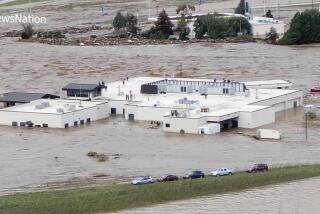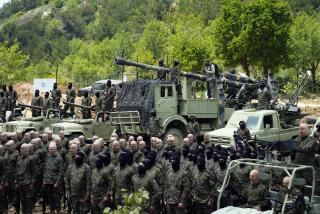Libya Plant ‘Tour’ Only Fuels Doubt : Foreign Press Gets View From Bus After Dark
RABTA, Libya — Libyan officials, attempting to disprove U.S. allegations that they are building a large chemical weapons factory, took Western reporters to see the facility Saturday but succeeded only in increasing suspicions that they had something to hide.
These suspicions were magnified when, less than an hour after returning from a whirlwind after-dark ride through the factory complex at Rabta, 40 miles southwest of Tripoli, the journalists were informed that they were being expelled from Libya aboard specially chartered flights to Malta.
Authorities later relented and told the journalists they could remain until this morning and leave on regularly scheduled flights to destinations of their choice.
Surprise Kadafi Visit
Earlier Saturday, Libyan leader Moammar Kadafi urged officials of the incoming Bush Administration in Washington to hold direct talks with his government. Making a surprise visit to Tripoli’s waterfront Al Kabir Hotel where reporters were staying, Kadafi said:
“The Bush Administration must sit face to face with Libya so that we can agree on the issues in dispute.”
Kadafi himself told the journalists that they would be allowed to see the Rabta factory, but the frustrating visit that the journalists later made turned out to be anything but a close inspection.
A number of intriguing discrepancies, while not conclusive in themselves, also raised many more questions about the nature of the factory than the brief and ultimately farcical tour of the facility answered.
Turning off the main highway southwest of Tripoli and onto the access road to the plant, the reporters passed two military checkpoints, at least one large radar installation and several anti-aircraft missile sites perched on the bluffs above the isolated desert plain where the factory is located.
Anti-American Protest
The reporters were first driven to a staging area about a mile from the plant, where several hundred Libyan citizens staged an anti-American demonstration in front of television cameras.
Libyan officials said that thousands of ordinary Libyans have flocked to the plant in recent days to demonstrate against the United States and to defend the factory against a possible attack.
One demonstrator, however, glancing around quickly to make sure no officials would overhear him, conceded that he had been ordered to come to the plant. Many others appeared less enthusiastic about “sacrificing themselves in the defense of their achievements” than Libyan Information Minister Rajab abu Dabbous had said they were last Friday.
This appeared to lend credence to suggestions by Western diplomats here that the Libyans were obliging civilians to move into the area around the plant in an effort to deter the United States from attacking it.
The reasons for the heavy defenses surrounding the isolated site, which appeared to be inconsistent with what the Libyans say is the nature of the plant, also have been questioned by diplomats here.
“I don’t know for sure, but if it is a pharmaceutical plant, why is it so isolated?” one Western envoy asked. “You would think that it would be located near a hospital or in a city. No other factory of this type has missile sites around it.”
The reporters saw several truckloads of foreign construction workers leaving the plant as they arrived. They were not allowed to talk to the workers, but most of them appeared to be from Thailand. Signs in Thai were posted in the cafeteria where the workers eat, and one of them nodded affirmatively from a passing truck when asked if he was from Thailand.
Washington has named companies from West Germany, Japan and South Korea as having helped Libya build the plant, but this was the first evidence that foreign workers are also involved.
The reporters met in the cafeteria with the plant’s medical director, Dr. Ali Ibrahim, who repeated the official Libyan position that only medicines and other pharmaceuticals for civilian use are being made there.
From the cafeteria, located nearly a mile from the main facility,the visitors boarded three buses that, only after nightfall, whisked them through the plant without making any stops.
Although it was difficult in the darkness and from the moving buses to examine the facility, it appeared to consist of at least half a dozen white and windowless rectangular buildings two and three stories tall.
Standing away from the plant, but apparently also a part of the facility, were a number of large, round, concrete-based storage tanks, arranged in clusters of four. Soldiers were encamped in tents around the storage tanks.
In addition to the restrictions placed on what the reporters were allowed to see, several other anomalies struck the visitors as significant. One was the extraordinary security for the visit. Reporters were assigned to specific buses, and their names were checked off on a list each time they re-boarded them. This security precaution has not been used on other tours that the Libyans have arranged for reporters. Many of the officials accompanying them also appeared more nervous than usual.
200 Journalists
Back in Tripoli later, when authorities were asked why the foreign journalists--more than 200 of whom had arrived in Libya last week after a clash between U.S. and Libyan jet fighters over the Mediterranean--were being expelled, one official said it was because an “important delegation” was arriving here today. He said that their hotel rooms were needed to accommodate the newcomers.
Other, more sympathetic officials suggested, however, that this was an excuse to get rid of the journalists, whose welcome appeared to have suddenly worn out after the visit to Rabta.
The United States, citing “conclusive evidence” from satellite photographs and other sources of intelligence, has said that the factory was constructed to produce chemical weapons, including mustard gas and sarin, a deadly nerve agent.
When fully operational, the nearly completed facility nestled in the remote and desolate foothills of the Tripoli Mountains will be able to produce between 22,000 and 84,000 pounds of mustard and nerve agents daily, making it the largest chemical weapons factory in the Third World, U.S. officials have said.
Citing the potential danger of letting a nation like Libya, which the United States accuses of supporting terrorist movements around the world, produce chemical weapons, the Reagan Administration last month said it was considering a military strike to destroy the factory.
Kadafi’s surprise appearance before the foreign journalists Saturday morning was made with his customary flamboyance. He turned up at their hotel in a long brown cape and driving his own white Peugeot, followed by several carloads of security agents. He accused the United States of trying to “terrorize” Libya and other small countries and said that he would not give in to American threats “even if the confrontation and the pressures . . . last a million years.”
Yet, the colonel also appeared to be seeking a peaceful way out of his latest confrontation with Washington with his suggestion that face-to-face talks be held.
Besides offering to open a dialogue with the United States, Kadafi indicated that Libya would allow international inspection of the Rabta plant and said it is willing to participate in “all negotiations to get rid of weapons in the world, from ordinary guns to nuclear bombs.”
More to Read
Sign up for Essential California
The most important California stories and recommendations in your inbox every morning.
You may occasionally receive promotional content from the Los Angeles Times.










